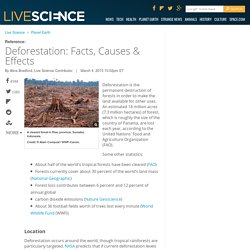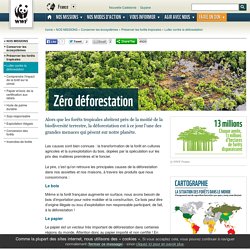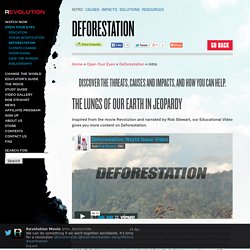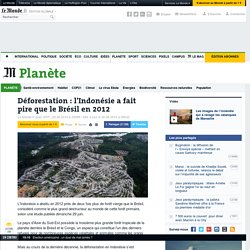

General.cfc (JPEG Image, 1200 × 1164 pixels) - Scaled (85%) Solutions to Deforestation. "I speak for the trees, for the trees have no tongues" -The Lorax, Dr.

Seuss Around the world, forests are being logged for timber and paper pulp and cleared to grow mono-crops like palm oil and soy while they are deteriorating from the impacts of global warming. Deforestation is a major driver of global warming, responsible for up to 20 percent of global greenhouse gas emissions–more than all the cars, trucks, planes, boats and trains in the world combined. Deforestation doesn’t just threaten our climate, it threatens the livelihoods of 1.6 billion people that rely on forests for food and economic activity. Forests also serve as habitats to rare and undiscovered animal and plant species and play a key role in providing water and preventing flooding and erosion.
Ending deforestation and protecting forests will not only preserve biodiversity and defend the rights of forest communities, it is also one of the quickest and cost effective ways of curbing global warming. 1. 2. 3. Deforestation: Facts, Causes & Effects. Deforestation is the permanent destruction of forests in order to make the land available for other uses.

An estimated 18 million acres (7.3 million hectares) of forest, which is roughly the size of the country of Panama, are lost each year, according to the United Nations' Food and Agriculture Organization (FAO). Some other statistics: About half of the world's tropical forests have been cleared (FAO) Forests currently cover about 30 percent of the world’s land mass (National Geographic) Forest loss contributes between 6 percent and 12 percent of annual global carbon dioxide emissions (Nature Geoscience) About 36 football fields worth of trees lost every minute (World Wildlife Fund (WWF)) Deforestation occurs around the world, though tropical rainforests are particularly targeted. NASA predicts that if current deforestation levels proceed, the world's rainforests may be completely in as little as 100 years. Error loading player: No playable sources found Weather vs.
Deforestation. Wildfires Article, Forest Fires Information, Wildland Fires Facts. Uncontrolled blazes fueled by weather, wind, and dry underbrush, wildfires can burn acres of land—and consume everything in their paths—in mere minutes.

On average, more than 100,000 wildfires, also called wildland fires or forest fires, clear 4 million to 5 million acres (1.6 million to 2 million hectares) of land in the U.S. every year. In recent years, wildfires have burned up to 9 million acres (3.6 million hectares) of land. A wildfire moves at speeds of up to 14 miles an hour (23 kilometers an hour), consuming everything—trees, brush, homes, even humans—in its path. There are three conditions that need to be present in order for a wildfire to burn, which firefighters refer to as the fire triangle: fuel, oxygen, and a heat source. Lutter contre la déforestation. Alors que les forêts tropicales abritent près de la moitié de la biodiversité terrestre, la déforestation est à ce jour l’une des grandes menaces qui pèsent sur notre planète.

Greenpeace France. La forêt recule.

Deforestation Intro - Revolution. Discover the threats, causes and impacts, and how you can help.

The Lungs of Our Earth in Jeopardy Inspired from the movie Revolution and narrated by Rob Stewart, our Educational Video gives you more content on Deforestation. Trees are a vital organ of our planet and our survival. Our forests control climate, cycle water, protect soil, store carbon, supply medicine and most importantly produce more than 40 percent of the world’s oxygen. Currently, trees cover approximately 31 percent of the earth. Deforestation, the loss of forests around the world, is occurring at an astounding rate of one football field per second. Forests are the lungs of the earth Tree evolution has changed little in the last 70 million years. The more trees we lose, the less oxygen we have to breathe. Learn more about our beautiful forests and the devastation deforestation is causing by reading on and sharing this information with everyone you know. Déforestation : l'Indonésie a dépassé le Brésil en 2012.
L'Indonésie a abattu en 2012 près de deux fois plus de forêt vierge que le Brésil, considéré comme le plus grand destructeur au monde de cette forêt primaire, selon une étude publiée dimanche 29 juin.

Le pays d'Asie du Sud-Est possède la troisième plus grande forêt tropicale de la planète derrière le Brésil et le Congo, un espace qui constitue l'un des derniers refuges pour de nombreuses espèces végétales et animales comme les orang-outans, les éléphants et tigres de Sumatra. Mais au cours de la dernière décennie, la déforestation en Indonésie s'est considérablement accélérée au profit du commerce du bois et des plantations d'huile de palme – dont l'archipel est le plus grand producteur mondial – en dépit d'un moratoire sur les permis de défrichement. Lire aussi l'entretien : « Le morcellement des grandes forêts tropicales est inéluctable » De la hauteur de la canopée des forêts. Déforestation: l'un des enjeux-clés de Cancun.